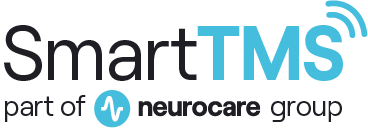TMS treatment for Postnatal Depression
TMS for postpartum depression is an innovative approach to treating antenatal and postnatal depression.
.jpg?width=1480&height=500&name=tms-for-depression-female-patient_smart%20TMS_banner%20(1).jpg)
Straight to:
Transcranial Magnetic Stimulation (TMS) is a gentle therapy that uses magnetic pulses to soothe the brain areas responsible for mood and motivation.

Depression can take away your joy, energy, and future dreams. TMS treatment can help restore these.
Contact us to learn more about how TMS can assist you. Call: (01) 254 2514

Understanding postnatal depression
Postnatal depression often starts in the months after pregnancy, casting a shadow over what should be a joyful time. TMS treatment can help lift this shadow, offering relief and hope.
Traditional treatments for depression, like medication and therapy, don't always work. Many medications aren't safe during pregnancy or breastfeeding because they affect the whole body and can reach the baby. Postpartum TMS treatment focuses directly on the brain area causing the condition, making it a safe option for expectant and breastfeeding mothers without using chemicals.
Studies have demonstrated that Transcranial Magnetic Stimulation (TMS) can alleviate symptoms in individuals experiencing postnatal depression.
TMS is a safe and effective alternative to traditional treatments, requiring no anaesthetic, hospitalisation, or recovery time, and it has fewer side effects than medication.
Up to 1 in 10 mothers experience postnatal depression (PND) in the months and years after childbirth. While less often discussed, fathers and partners can also face this challenge.
In the first two weeks after giving birth, new mothers often feel anxious, exhausted, and tearful due to significant life changes. If these feelings continue beyond this period, they may indicate postnatal depression (PND). Symptoms of PND include:
- A persistent feeling of sadness;
- Loss of feelings of enjoyment and interest;
- Difficulty sleeping, even though you know you need to rest;
- Difficulty bonding with the new baby;
- Problems making decisions;
- Scary thoughts – for instance, thinking about hurting your baby.

How does TMS work for postnatal depression?
The treatment stimulates the prefrontal cortex, the brain area responsible for mood, motivation, and social skills. Unlike medication that may numb emotions, TMS addresses the root cause by resetting brain patterns and pathways with targeted magnetic pulses.
A typical TMS treatment plan for postnatal depression includes 30 sessions over three to six weeks. Each session lasts 30 minutes, and some patients can have multiple sessions in a day.
TMS can help you enjoy life all year round.

What is TMS treatment for postpartum depression?
Transcranial Magnetic Stimulation (TMS), also called repetitive Transcranial Magnetic Stimulation (rTMS), is an innovative therapy for postpartum depression.
TMS, often known as "magnetic therapy for postnatal depression," is a versatile treatment. This non-invasive therapy uses magnetic pulses to target specific brain areas, effectively alleviating symptoms of depression, OCD, addiction, and other mental health conditions.
TMS focuses on the specific brain circuits related to your condition, avoiding the use of chemicals. Unlike medication, it has minimal side effects.
TMS treatment costs
Assessment price
Once you've completed the online questionnaires and confirmed TMS is suitable for you, you'll have a video chat with one of our expert clinicians. This session allows you to discuss your condition, ask questions, and get personalised advice on how TMS can help you.
The cost of this assessment is €300 .
Depression & anxiety treatment prices
At Smart TMS, we understand that many of our patients experience both depression and anxiety. That's why we treat these conditions together in the same session.
TMS treatment for depression and anxiety consists of two courses. Most patients notice significant improvements after 15 sessions.
| Dublin location | |
| Initial course (15 sessions) |
€3,000 |
| Second course (15 sessions) |
€3,000 |
| Total costs (including assessment) |
€6,300 |
"After my PND diagnosis, I didn’t receive any treatment as I was so concerned about how tablets would affect me. TMS gave me the option to avoid medication completely."
"Thank you Smart TMS, I was really struggling with depression after my son was born and TMS really helped me get back to myself and my family. "
"The practitioner who carries out my treatment was very professional and made the whole experience stress free."
Continuous care

Dr. Neal and his team are committed to ensuring patients remain healthy after completing their TMS treatment. With insights from research and our experience, we've created aftercare packages that offer ongoing support through a structured program of regular follow-up treatments.
Have you had TMS treatment for depression at another clinic? Smart TMS can offer you maintenance therapy, too.
Ready to explore TMS therapy?
Smart TMS Info Brochure
Get access to our free brochure & make an informed choice about TMS treatment









